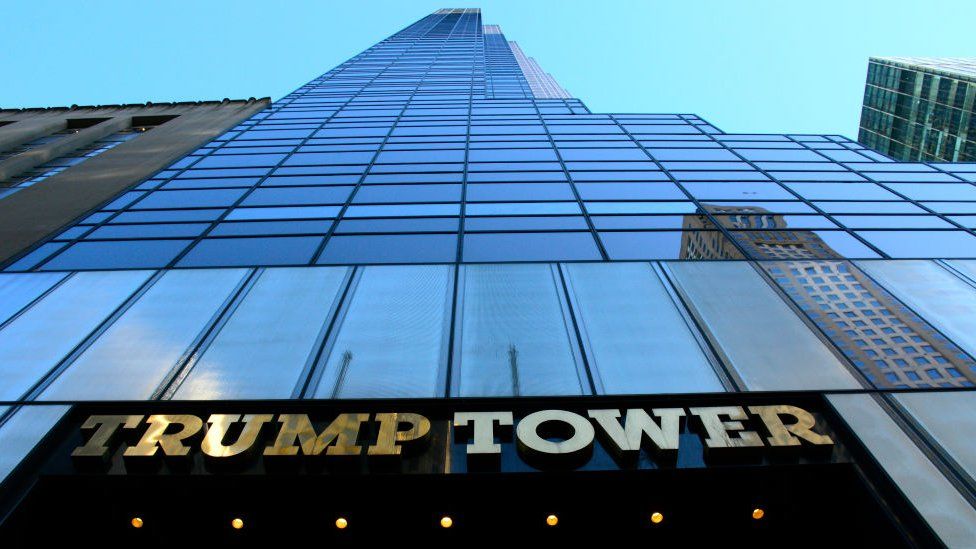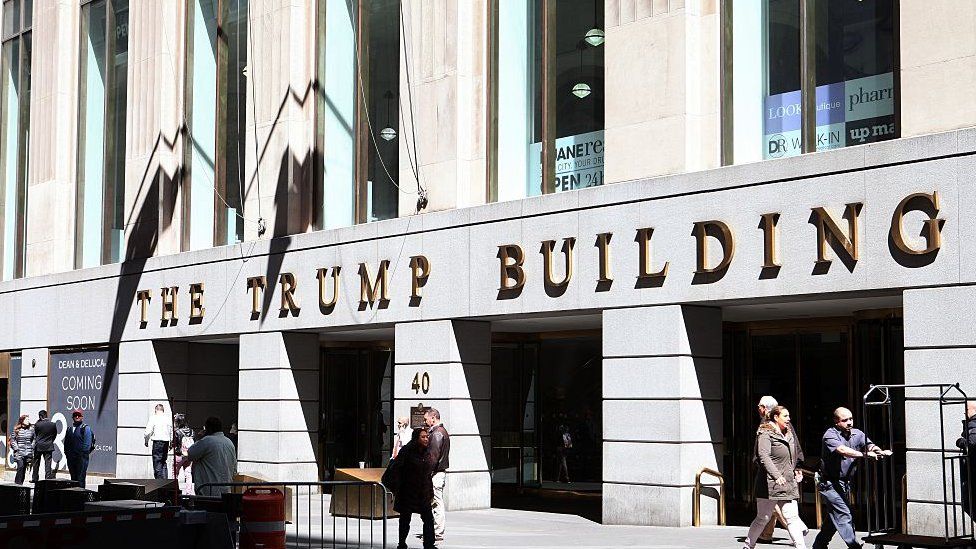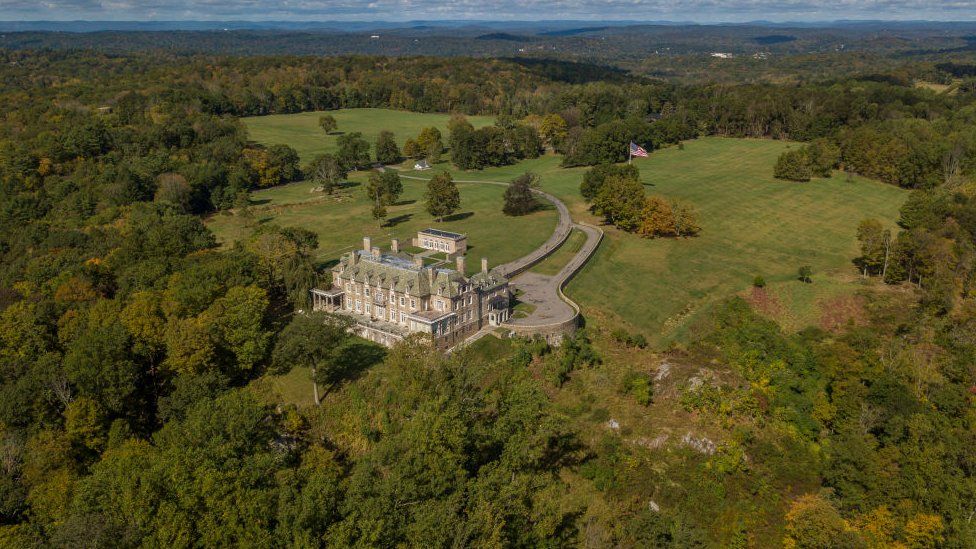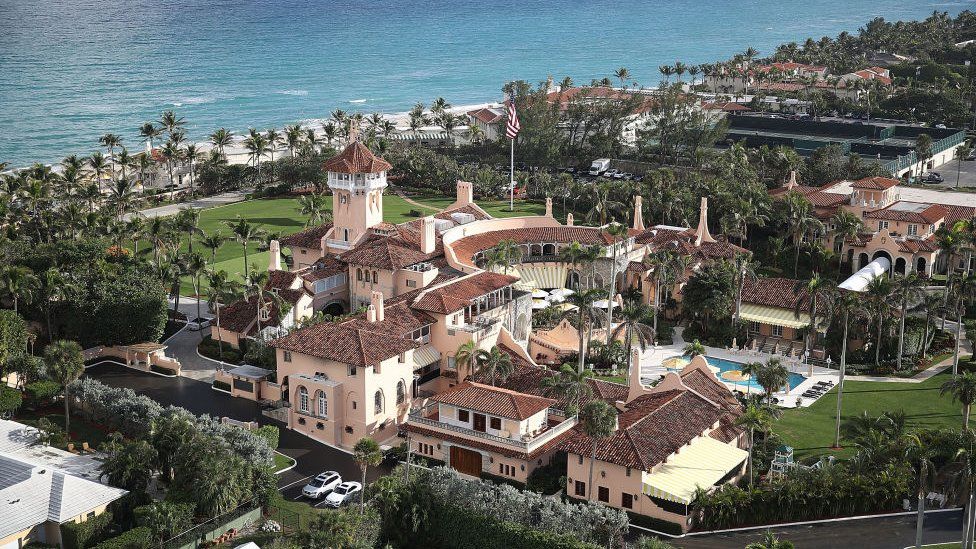
This article is more than
2 year old
Now, a judge's ruling that his business committed massive fraud has thrown the fate of some of the former president's flagship properties into doubt.
On Tuesday, Judge Arthur Engoron ordered that some of Mr Trump's companies be removed from his control.
Mr Trump has denied any wrongdoing and is expected to appeal.
The ruling was part of a lawsuit filed against Mr Trump and his family by New York Attorney General Letitia James, who asked the judge for a summary decision that certain facts in the case were beyond dispute in the hope of speeding up the impending trial.
It severely limits Mr Trump's ability to do business in New York, the place where he launched the real estate empire that thrust him into the national spotlight.
What the ruling means for Mr Trump's properties, however, remains uncertain.
The Trump Organization could be forced to hand over control to a court-appointed receiver, or ultimately have to sell some of its most iconic landmarks. Mr Trump's lawyers have asked for more clarity on which properties could be affected. The judge has yet to give a definitive answer.
For Mr Trump, the stakes are potentially high. Earlier this year, Forbes estimated that his New York properties alone are worth $720m (£589m), a sizable chunk of his estimated $2.5bn fortune.
Let's take a look at some of the properties that Mr Trump might lose.

Trump Tower
Located on Fifth Avenue in Manhattan, the 58-floor Trump Tower is among the most recognisable properties bearing Mr Trump's name. The building is the headquarters of the embattled Trump Organization and has been home to Mr Trump and several of his family members.
The building - which was developed by Mr Trump and inaugurated in 1983 - has also featured prominently in popular culture, including serving as the location for Batman's Wayne Enterprises in Christopher Nolan's 2012 film The Dark Knight Rises.
Mr Trump's penthouse condominium that spans the top three floors of the building is also among the properties highlighted in James' lawsuit.
The lawsuit alleges that Mr Trump artificially inflated the triplex's value, by repeatedly saying it was more than 30,000 sq ft (2,790 sq m) in size, significantly larger than the 11,000 sq ft listed in property records.
The penthouse was valued at$327m in 2015, a price that the lawsuit called "absurd".
"Tripling the size of the apartment for purposes of the valuation was intentional and deliberate fraud," the lawsuit reads. "Not an honest mistake".

40 Wall Street
Originally completed in 1930, the 72-story neo-Gothic tower in the heart of New York's financial district was purchased by a Trump-controlled company in 1995. The building's website proudly boasts that the purchase was "one of the great real estate deals of all time".
Since the purchase, the building's tenants have included global giants such as American Express, defunct investment bank Bear Stearns and Hilton Hotels & Resorts.
In the New York lawsuit, prosecutors alleged that the values given by Mr Trump and the Trump Organization "far exceeded the values determined by professionals" in lender-ordered appraisals.
In 2012, for example, the property was valued by the company at $572m in financial statements - more than twice the value reached by the outside appraisals.
By early this year, the building had been added to a lender watchlist because of concerns over rising expenses and vacancies, according to Bloomberg.

Seven Springs Estate
Vaunted as "one of the most prestigious private estates" by the Trump Organization, the verdant 212-acre estate stretches across the towns of Bedford, Armonk and Chappaqua in New York's Westchester Country. It was built in 1919 by former Washington Post publisher Eugene Meyer and bought by the Trump Organization in 1996.
A large Georgian-style mansion surrounded by nature preserves, the property is atypical of Mr Trump's holdings, which tend to sparkle and shine with gold-plated décor.
As is the case with the other properties in the lawsuit, the Trumps are accused of overvaluing the estate.
Mr Trump's son Eric is also accused of pushing for developments there that were not approved and "not feasible", as well as hiding the estate's true value and fraudulently increasing the value of tax deductions stemming from it.

Mar-a-Lago
The extent of Judge Engoron's recent ruling is still unclear, but could potentially extend far beyond New York's borders to properties that controlled by New York based limited liability companies, or LLCs.
This could reportedly include Mr Trump's famous 17-acre Mar-a-Lago estate in Palm Beach, Florida, where he currently resides.
In his ruling, Mr Engoron determined that Mr Trump inflated the value of Mar-a-Lago by as much as 2,300%.
The ruling cited an appraisal from the Palm Beach County Assessor's office, which placed the property's value at between $18m and $27.6m.
The valuation sparked an angry response from Mr Trump, who called Mr Engoron "unhinged" and a "political hack judge".
On X, the platform formerly known as Twitter, Eric Trump speculated that Mar-a-Lago is worth a billion dollars, "making it arguably the most valuable residential property in the country".
His brother Donald Trump Jr mocked the assessment writing: "If Mar-a-Lago is worth $18 million... I'll take 10 please!!"